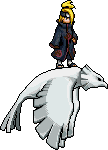A pronoun is used in
place of a noun or nouns. Common pronouns include he, her, him, I, it, me,
she, them, they, us, and we. Here are some examples:
INSTEAD OF: Luma is a good athlete.
She is a
good athlete. (The pronoun she replaces Luma.)
INSTEAD OF: The
beans and tomatoes are fresh-picked.
They are
fresh-picked. (The pronoun they replaces the beans and
tomatoes.)
Often a pronoun
takes the place of a particular noun. This noun is known as the antecedent. A
pronoun "refers to," or directs your thoughts toward, its antecedent.
Let's call Luma
and ask her to join the team. (Her is a pronoun; Luma is its
antecedent.)
To find a
pronoun's antecedent, ask yourself what that pronoun refers to. What
doesher refer to in the sentence above—that is, who is
the her? The her in the sentence is Luma;
therefore, Luma is the antecedent.
Subjective Pronouns
A subjective
pronoun acts as the subject of a sentence—it performs the action of the verb.
The subjective pronouns are he, I, it, she, they, we, and you.
He spends
ages looking out the window.
After lunch, she
and I went to the planetarium.
Objective Pronouns
An objective
pronoun acts as the object of a sentence—it receives the action of the verb.
The objective pronouns are her, him, it, me, them, us, and you.
Cousin Eldred
gave me a trombone.
Take a picture
of him, not us!
Possessive Pronouns
A possessive
pronoun tells you who owns something. The possessive pronouns arehers, his,
its, mine, ours, theirs, and yours.
The red basket
is mine.
Yours is on
the coffee table.
Demonstrative Pronouns
A demonstrative
pronoun points out a noun. The demonstrative pronouns are that, these,
this, and those.
That is a
good idea.
These are
hilarious cartoons.
A demonstrative
pronoun may look like a demonstrative adjective, but it is used differently in
a sentence: it acts as a pronoun, taking the place of a noun.
Interrogative Pronouns
An interrogative
pronoun is used in a question. It helps to ask about something. The
interrogative pronouns are what, which, who, whom, and compound words
ending in "ever," such as whatever, whichever,
whoever, and whomever.
What on
earth is that?
Who ate the
last Fig Newton?
An interrogative
pronoun may look like an interrogative adjective, but it is used differently in
a sentence: it acts as a pronoun, taking the place of a noun.
Indefinite Pronouns
An indefinite
pronoun refers to an indefinite, or general, person or thing. Indefinite
pronouns include all, any, both, each, everyone, few, many, neither, none,
nothing, several, some, and somebody.
Something smells
good.
Many like
salsa with their chips.
An indefinite
pronoun may look like an indefinite adjective, but it is used differently in a
sentence: it acts as a pronoun, taking the place of a noun.
Relative Pronouns
A relative
pronoun introduces a clause, or part of a sentence, that describes a noun. The
relative pronouns are that, which, who, and whom.
You should bring
the book that you love most.
That introduces
"you love most," which describes the book.
Hector is a
photographer who does great work.
Who introduces
"does great work," which describes Hector.
Reflexive Pronouns
A reflexive
pronoun refers back to the subject of a sentence. The reflexive pronouns
areherself, himself, itself, myself, ourselves, themselves, and yourselves. Each
of these words can also act as an intensive pronoun (see below).
I learned a lot
about myself at summer camp. (Myself refers back to I.)
They should
divide the berries among themselves. (Themselves refers back
to they.)
Intensive Pronouns
An intensive
pronoun emphasizes its antecedent (the noun that comes before it). The
intensive pronouns are herself, himself, itself, myself, ourselves,
themselves, andyourselves. Each of these words can also act as a
reflective pronoun (see above).
I myself don't
like eggs.
The queen
herself visited our class.
Ref:
http://www.towson.edu/ows/pronouns.htm
http://www.towson.edu/ows/pronouns.htm


